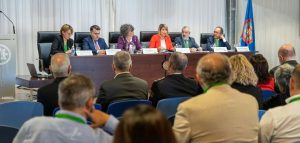
Acto inaugural
Este jueves 17 y viernes 18 de noviembre tuvo lugar el II Simposio de Patrimonio Cultural ICOMOS-España, llevado a cabo en el edificio CIM de la Universidad Politécnica de Cartagena (Murcia).
El encuentro dio comienzo con un acto inaugural en el que participaron personalidades como D. Jordi Tresseras Juan -presidente de ICOMOS-España-, Dña. Beatriz Miguel Hernández -rectora de la Universidad Politécnica de Cartagena-, D. Marcos Ortuño Soto -consejero de Presidencia, Turismo, Cultura y Deportes del Gobierno de la Comunidad Autónoma de la Región de Murcia-, Dña. Noelia María Arroyo Hernández -alcaldesa del Excmo. Ayuntamiento de Cartagena- Dña. Silvia Rodríguez-Bermejo Martínez -jefa de área de Protección de Patrimonio y Proyectos Europeos del Ministerio de Cultura y Deporte- y D. Juan Andrés Perelló Rodríguez, director general de Casa Mediterráneo-. Este acto fue seguido de una conferencia inaugural y ponencias invitadas donde se mencionaba, no sólo el estado de emergencia en el que nos encontramos por el cambio climático, sino también se hizo referencia al aniversario de la Convención de Patrimonio Mundial, haciendo hincapié en los 49 sitios declarados que tenemos en España.
Fueron un total de 29 mesas de comunicaciones agrupadas por temáticas y realizadas en sesiones paralelas distribuidas en distintas salas. El objetivo inicial de este foro fue exitosamente cumplido ya que fueron presentadas diversas investigaciones y desarrollos en el campo de la conservación, restauración, documentación, protección, gestión y difusión de monumentos, conjuntos, sitios y manifestaciones del patrimonio cultural. Los ejes temáticos fueron variados, entre los que se pudo observar: análisis y restauración de estructura del Patrimonio Arqueológico, Gestión de este mismo patrimonio, arte rupestre, patrimonio subacuático, fortificaciones y patrimonio militar, patrimonio industrial, entre otros. Sin embargo, todos estos temas se enmarcaban en unas ideas fundamentales: la sostenibilidad, la inclusión y la óptima gestión en la protección de nuestro patrimonio, haciendo especial hincapié en la importancia de la educación y la divulgación.
En especial, uno de los temas principales que se repitió en numerosas mesas de comunicaciones fue el patrimonio subacuático, haciendo especial referencia a la complejidad de su protección y generando debates alrededor de casos prácticos expuestos por profesionales de la materia.
El Simposio finalizaba con una serie de visitas patrimoniales guiadas que se llevaron a cabo durante la mañana del sábado.
Cartagena ha sido estos días, sin duda, un espacio de unión y reflexión, representando un impulso en la larga carrera que aun nos compete para la mejora de numerosas actividades que ayudan a la protección del patrimonio y se alinean con la Agenda 2030, factor importante a tener en cuenta en la última década de la iniciativa.
__
REVIEW II SYMPOSIUM ON CULTURAL HERITAGE ICOMOS-SPAIN
The II Symposium on Cultural Heritage ICOMOS-Spain took place on Thursday 17th and Friday 18th November at the CIM building of the Polytechnic University of Cartagena (Murcia).
The meeting began with an opening ceremony in which participated personalities such as Mr. Jordi Tresseras Juan -president of ICOMOS-Spain-, Ms. Beatriz Miguel Hernández -president of the Polytechnic University of Cartagena-, Mr. Marcos Ortuño Soto -councilor of Presidency, Tourism, Culture and Sports of the Government of the Autonomous Community of the Region of Murcia-, Ms. Noelia María Arroyo Hernández -Mayor of the City Council of Cartagena- Ms. Silvia Rodríguez-Bermejo Martínez -Head of Heritage Protection and European Projects of the Ministry of Culture and Sports- and Mr. Juan Andrés Perelló Rodríguez, General Director of Casa Mediterráneo-. This event was followed by an inaugural conference and guest speakers who mentioned not only the state of emergency in which we find ourselves due to climate change, but also referred to the anniversary of the World Heritage Convention, emphasizing the 49 declared sites that we have in Spain.
There were a total of 29 communication tables grouped by theme and carried out in parallel sessions distributed in different rooms. The initial objective of this forum was successfully achieved, as various research and developments in the field of conservation, restoration, documentation, protection, management and dissemination of monuments, ensembles, sites and manifestations of cultural heritage were presented. The thematic axes were varied, including: analysis and restoration of the structure of archaeological heritage, management of this same heritage, rock art, underwater heritage, fortifications and military heritage, industrial heritage, among others. However, all these topics were framed in some fundamental ideas: sustainability, inclusion and optimal management in the protection of our heritage, with special emphasis on the importance of education and outreach.
In particular, one of the main themes that was repeated in numerous communication tables was underwater heritage, making special reference to the complexity of its protection and generating debates around practical cases presented by professionals in the field.
The Symposium ended with a series of guided heritage tours that took place on Saturday morning.
Cartagena has been these days, without a doubt, a space of union and reflection, representing an impulse in the long race that still competes us for the improvement of numerous activities that help the protection of heritage and are aligned with the 2030 Agenda, an important factor to take into account in the last decade of the initiative.
__

